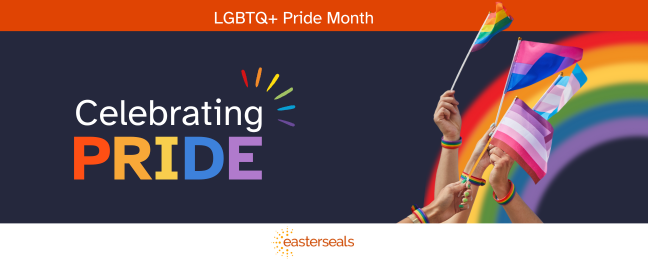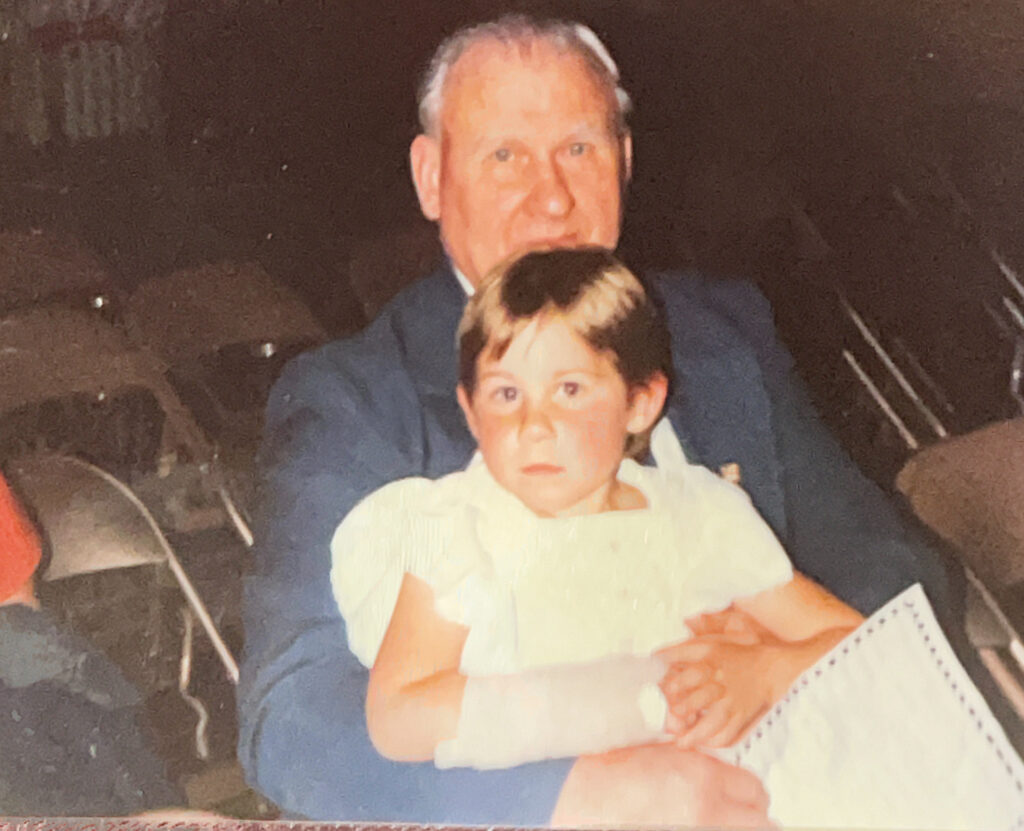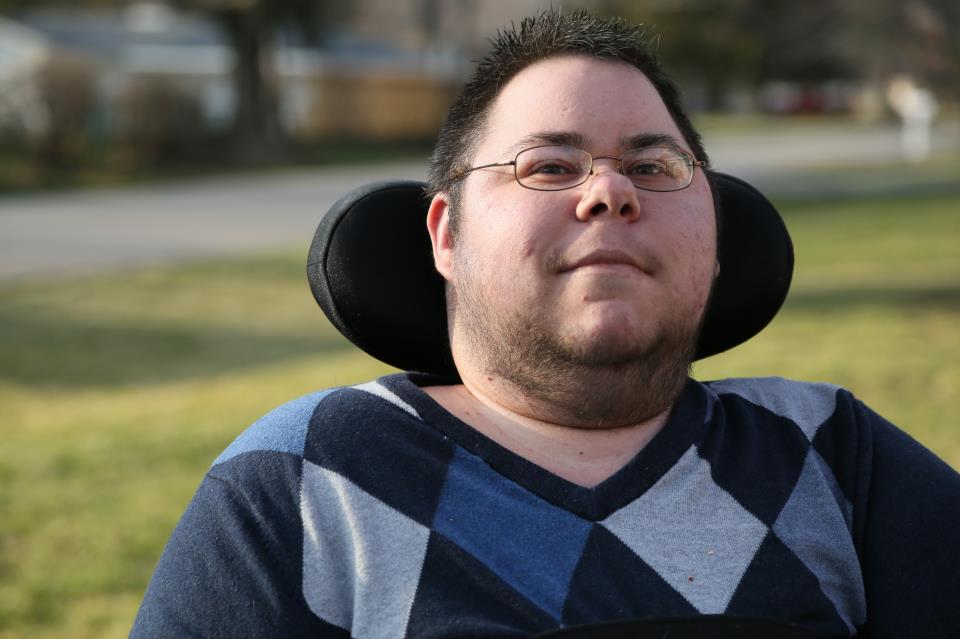Disabled, Trans, and Denied: Experiences with Problems in Medical Care
by Blog Writers

Editor’s Note: This blog contains detailed descriptions of medical trauma and abuse. Please take care when reading.
By Dom Evans
The medical establishment was not designed with disabled people in mind. Especially not those with disabled bodies.
I’ve known this since I was a small child. My first harmful medical experience was at maybe four or five.
When I was two, doctors discovered I was born without a left hip socket. They had to form one, so I was put in various braces until the socket formed about a year later.

Dom as a child and his grandfather.
After the braces came off, I had muscle weakness.. They did not understand why. So, I went through every test possible. It was a painful couple years before they discovered I had Spinal Muscular Atrophy (SMA). My orthopedic surgeon was involved in this surgery and it was after I was recovering where problems first started.
I was four and a half at the time, and had recently had a muscle biopsy on my right leg, which produced a horizontal scar. Inquisitively, I asked my surgeon when I would be able to run and jump, since I couldn’t. I also asked him when my scar would go away.
Callously, he looked at me and said, “Never! You’ll never be normal or run or jump. Get used to it.” He then walked off. I immediately started crying hysterically.
For me, being disabled means going to multiple doctors multiple times throughout the year.
Especially when I was younger, there were lots of tests, checkups, and general wellness meetings.
Back then, it would depend on the doctor whether I received good care or whether they listened to me or not. I’d find good doctors that actually cared about my health and stick with them for years.
Even worse though was the unexpectedness of an emergency stay where I could never predict what kind of care I would get. That was where I received the bulk of the abuse from the medical establishment when I was younger.
All of that changed when I came out as trans. I was 21, and had no idea what I was in for when it came to dealing with medical professionals as both a wheelchair-using disabled person and a trans person. After coming out as trans, finding medical care became even harder.
Note: I’m also neurologically diverse with ADHD, PTSD, and anxiety. I believe I didn’t receive my ADHD diagnosis until I was 39 due to medical professionals again neglecting very clear signs. They were too focused on my physical disability to notice or care.
My trans medical needs were hampered by my disability. I was experiencing quite a bit of dysphoria, and hormones along with a breast reduction (I was not able to get complete top surgery – it was not available to me) would help to all but obliterate most of my body dysphoria. Unfortunately, it would take me SEVEN years to gain access to hormones due to inaccessibility.
My transition was delayed by almost a decade due to medical ableism.
This was back in the early 2000s, and I lived in a Michigan county where there was not a single doctor that would provide hormone care or access to top surgery. I could go to the closest large city, but it was in a different county and I could not get any accessible transport to take me out of my county. I had to wait until I moved to a different state (we rented a wheelchair accessible van which was ridiculously expensive to rent) where there was a doctor in my county who prescribed me hormones.
What’s even worse is that being trans and disabled has almost gotten me killed more than once. The most egregious instance was when I had my hysterectomy, around 2012. That was such a horrible experience that I’ve been diagnosed with PTSD as a result of what happened at the hospital.
My hysterectomy had to happen. I was having intense bleeding that never stopped. Literally. I would bleed 365 days of the year, 24/7.
My doctors could not find out what was wrong because I could not get on a table to be examined. So, eventually they just put me on birth control. It stopped the bleeding but whenever it was time for my period I would have horrible cramping that left me doubled over in my wheelchair for hours.
 When I was on testosterone, it did not help this pain. So I ended up getting my hysterectomy. However, because I could not get on the table to be examined before surgery, they did not know I had an enlarged uterus. When they were taking my uterus out it ripped open at least one of the blood vessels that had been sealed and I was bleeding internally without anybody knowing.
When I was on testosterone, it did not help this pain. So I ended up getting my hysterectomy. However, because I could not get on the table to be examined before surgery, they did not know I had an enlarged uterus. When they were taking my uterus out it ripped open at least one of the blood vessels that had been sealed and I was bleeding internally without anybody knowing.
After being released home and a lot of medical gaslighting, it took a month for them to figure out I was slowly bleeding to death internally. After a night where it looked like I had been murdered when I bled all over my bed, I was rushed to the hospital where a nurse demanded I give her my ID. She wanted me to prove I was not a “female” because she was misgendering me.
Here I am, going in and out of consciousness, bleeding out, trying not to die with paramedics begging this nurse to get the doctor and get me a blood transfusion. Instead of doing all that, she “put me in a diaper to stop the flow of blood coming out of me” and told me once I got the ID she would get the doctor.
Luckily, eventually a doctor came in and got me a blood transfusion but for a while I thought I was dying as the blood continued to pour out of me. The transphobia of that nurse still makes me question anytime I feel sweaty, thinking I might’ve started bleeding again and might be dying again. It’s been a decade and it still affects me that deeply.
The truth is, when you are trans and disabled, you have to work even harder to prove you are a human being when you are receiving medical care. You have to prove to the doctors and nurses time and time again that you deserve to receive treatment.
I hope, as pride month continues, medical professionals become more aware of the intersection of disability and gender identity. Trans disabled people deserve to stay alive. We deserve healthcare that helps and affirms us. It’s the least the medical establishment could do for us as human beings.
Dom Evans is the founder of FilmDis, a media monitoring organization that studies and reports on disability representation in the media. He is a Hollywood consultant, television aficionado, and future showrunner. His knowledge and interest on disability extends through media, entertainment, healthcare, gaming and nerdy topics, marriage equality, sex and sexuality, parenting, education, and more. He was also featured in Season 1 of Everything You Know About Disability is Wrong, an Easterseals podcast.






